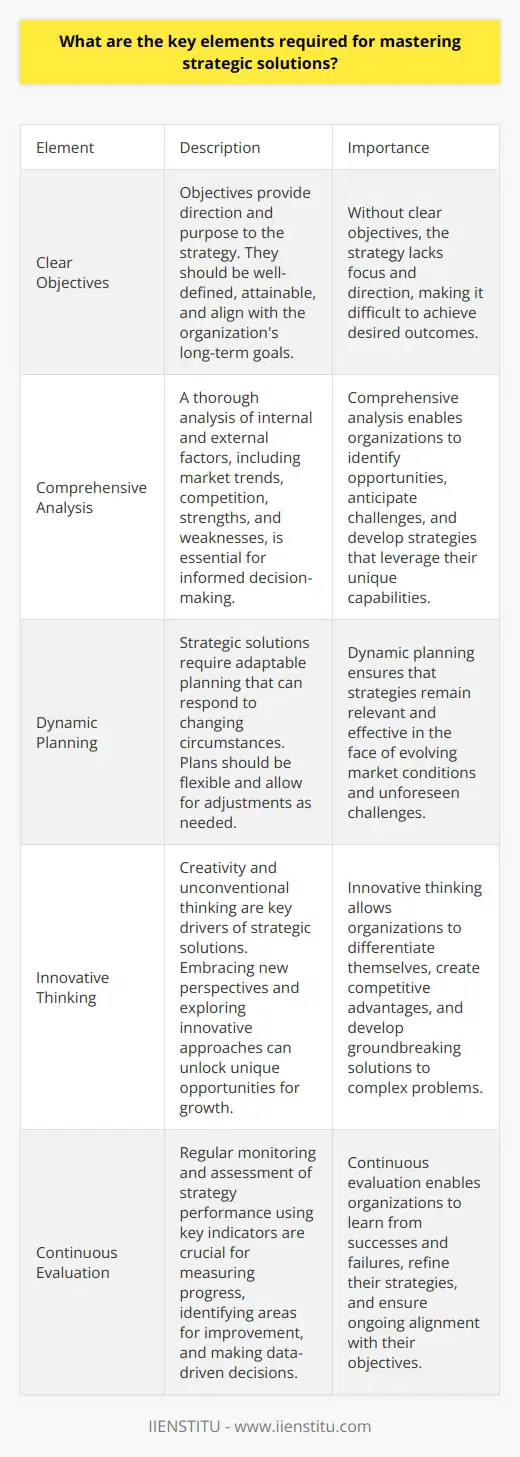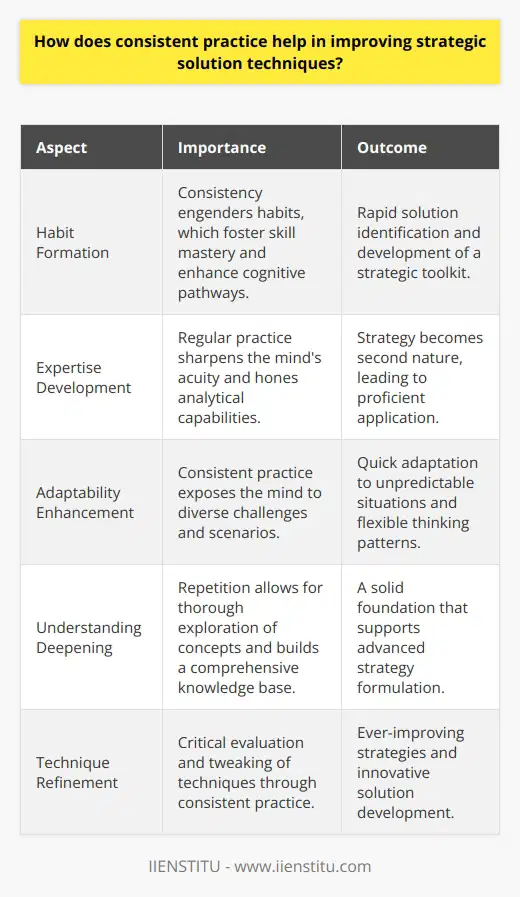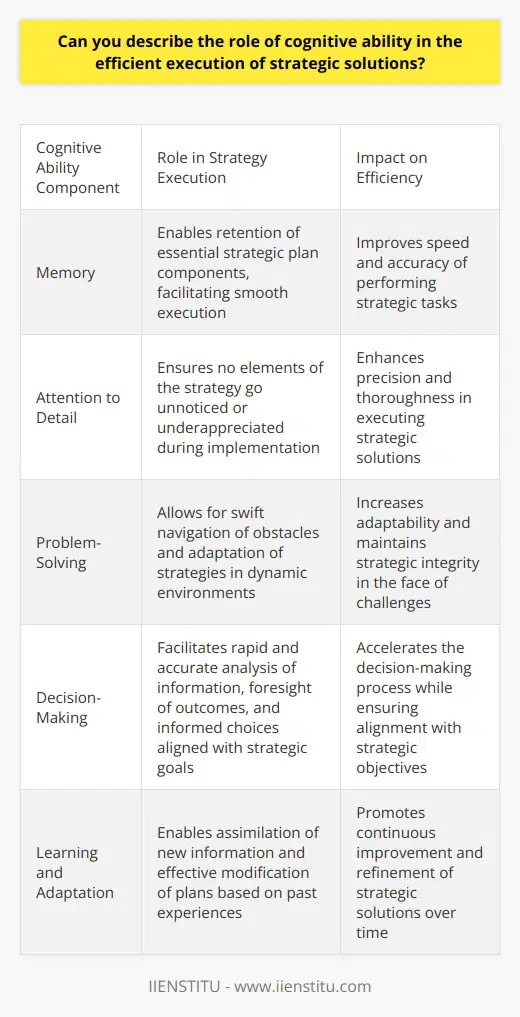
In the fast-paced, ever-evolving world of modern business, the ability to develop and implement effective strategic solutions has become an indispensable skill for success. Whether you're a budding entrepreneur leading a startup or a seasoned executive at the helm of a multinational corporation, mastering the art of strategic problem-solving is what sets industry leaders apart from the rest. Developing a strategic mindset is not just about learning the fundamentals; it's about continuously honing your skills to tackle new challenges head-on.
As someone who has spent years navigating the complex landscape of business strategy, I can attest to the transformative power of effective strategy implementation. When I first started my career, I found myself overwhelmed by the sheer complexity of the problems I faced. It was only through a combination of mentorship, hands-on experience, and a commitment to continuous learning that I began to develop the strategic acumen needed to thrive.
One of the turning points in my journey was attending a seminar on SWOT analysis for strategy development. The speaker, a renowned strategist with decades of experience, walked us through the process of identifying an organization's strengths, weaknesses, opportunities, and threats. Through interactive exercises and real-world examples, I learned how to use this powerful tool to gain a comprehensive understanding of a company's position and develop strategies to capitalize on its unique advantages.
But as I soon discovered, developing a strategy is only half the battle. The real challenge lies in overcoming the obstacles that inevitably arise during the implementation process. I vividly remember my first experience leading a major strategic initiative at my company. Despite countless hours of planning and preparation, we encountered a series of unexpected setbacks that threatened to derail the entire project.
It was during this time that I truly learned the importance of adaptability and resilience in the face of adversity. By staying focused on our ultimate goal and continuously adjusting our approach, we were able to navigate the challenges and ultimately achieve success. This experience taught me that effective strategy implementation is not about having a perfect plan, but rather about having the flexibility and determination to see it through.
Critical Chain Project Management: Enhancing Efficiency in Task Execution
Risk Mitigation: An Essential Strategy for Successful Project Management
As I progressed in my career, I began to recognize the value of continuous learning for strategic mastery. The business world is constantly evolving, and what worked yesterday may not work tomorrow. To stay ahead of the curve, I made a commitment to constantly update my skills and knowledge through a variety of methods, including:
1- Attending industry conferences and workshops
2- Pursuing advanced degrees and certifications
3- Seeking out mentorship opportunities
4- Engaging in self-directed learning through books and online courses
One of the most valuable learning experiences I had was pursuing an Executive MBA program at a top business school. Through a combination of classroom instruction, case studies, and hands-on projects, I was exposed to cutting-edge strategic frameworks and techniques for strategic problem-solving. I had the opportunity to learn from world-class faculty and collaborate with a diverse group of peers from a wide range of industries.
But perhaps the most impactful aspect of the program was the emphasis on real-world examples of strategic success. We analyzed case studies of companies that had achieved remarkable results through innovative strategic approaches, such as:
Apple's disruption of the mobile phone industry with the iPhone
Amazon's domination of the e-commerce space through customer-centric strategies
Tesla's transformation of the automotive industry through electric vehicles and sustainable energy
Through these examples, I learned that true strategic success often requires a willingness to challenge the status quo and take calculated risks. It's about having the courage to pursue bold visions and the perseverance to see them through, even in the face of skepticism and adversity.
Of course, achieving strategic mastery is not a solitary pursuit. It requires collaboration, communication, and the ability to inspire and motivate others. Some of the most effective leaders I've encountered are those who excel at building strong teams and fostering a culture of innovation and continuous improvement.
One such leader is Satya Nadella, the CEO of Microsoft. When Nadella took the helm in 2014, the company was facing significant challenges, including a stagnant stock price and a perception that it had fallen behind in the tech industry. But through a combination of strategic vision, organizational transformation, and a focus on empowering employees, Nadella was able to orchestrate a remarkable turnaround.
Under Nadella's leadership, Microsoft has regained its position as a leader in cloud computing, artificial intelligence, and other key areas of technology. The company's stock price has soared, and it is now one of the most valuable companies in the world. Nadella's success is a testament to the power of effective strategy, leadership, and a commitment to continuous learning and improvement (Nadella, 2017).
But strategic mastery is not just about achieving success; it's also about measuring and sustaining that success over time. This requires a systematic approach to tracking key performance indicators, setting benchmarks, and continuously assessing progress. It also involves a willingness to adapt and pivot when necessary, based on changing market conditions or new information.
One framework that can be particularly useful for measuring success in strategic implementation is the Balanced Scorecard (Kaplan & Norton, 1996). This approach evaluates organizational performance across four key dimensions:
1- Financial: How are we doing financially?
2- Customer: How well are we serving our customers?
3- Internal Processes: How efficiently and effectively are we running our operations?
4- Learning and Growth: Are we continuing to learn, innovate, and improve?
By tracking metrics across these four dimensions, organizations can gain a holistic view of their strategic performance and identify areas for improvement. This approach has been successfully adopted by countless organizations, from small startups to Fortune 500 companies (Niven, 2002).
Ultimately, mastering strategic solutions is a lifelong journey that requires dedication, perseverance, and a constant willingness to learn and grow. It's about developing the mental models and practical skills needed to navigate an increasingly complex and uncertain world. And it's about having the courage to take bold action in pursuit of your vision, while remaining adaptable and resilient in the face of challenges.
As you embark on your own journey towards strategic mastery, remember that success is not just about reaching your destination, but about the growth and learning that happens along the way. Embrace the challenges, seek out new experiences, and never stop pushing yourself to be better. With dedication and hard work, you too can become a master of strategic solutions and achieve extraordinary results in your personal and professional life.
References:
Kaplan, R. S., & Norton, D. P. (1996). The balanced scorecard: Translating strategy into action. Harvard Business Press.
Nadella, S. (2017). Hit refresh: The quest to rediscover Microsoft's soul and imagine a better future for everyone. Harper Business.
Niven, P. R. (2002). Balanced scorecard step-by-step: Maximizing performance and maintaining results. John Wiley & Sons.
Frequently Asked Questions
What are the key elements required for mastering strategic solutions?
Understanding Strategic Solutions
Mastering strategic solutions requires a deep understanding of the term. Strategic solutions involve a process. They deal with creating plans. These plans help achieve long-term goals. They are comprehensive in nature. Strategic solutions transcend simple problem-solving. They focus on crafting innovative approaches. These approaches enable organizations to grow.
Core Elements for Mastery
Clear Objectives
Objectives ground the strategy. They must be clear. They should be achievable. Objectives guide all strategic decisions. Without them, the strategy lacks direction.
Comprehensive Analysis
Analysis involves understanding the environment. Internal and external factors are critical. One must analyze the market. Also, consider the competition. Know your own organization well. Understand strengths and weaknesses.
Dynamic Planning
Strategic solutions are not static. They require flexibility. Agendas must evolve. They should respond to change. Adjustments are often necessary. Planning is an ongoing effort.
Innovative Thinking
Innovation drives strategic solutions. Conventional thinking has limits. Challenges demand new perspectives. Creativity is paramount. It can unlock new opportunities.
Effective Communication
Communication plays a vital role. Teams need clear directives. Stakeholders require updates. Misunderstandings can derail strategies. Clear, concise messaging is essential.
Decisive Execution
Action turns plans into reality. Decisions must be timely. Procrastination can be costly. Execution demands confidence. It often needs boldness.
Continuous Evaluation
Strategies need measuring. Performance indicators are vital. They help track progress. Adjustments rely on evaluation. Success and failure teach valuable lessons.
Developing Mastery
Education and Training
Knowledge is foundational. Education provides theoretical understanding. Training offers practical skills. Both are necessary for mastery.
Experience
Learning comes from doing. Experience builds expertise. It enriches understanding. It hones decision-making skills. Mistakes are learning opportunities.
Mentorship and Collaboration
Guidance accelerates learning. Mentors share insights. Collaboration encourages different viewpoints. It fosters a rich learning environment.
Adaptability
Change is constant. Mastery requires adaptability. One must embrace learning. Skills must evolve. Adaptability ensures long-term success.
Conclusion
Mastering strategic solutions demands dedication. It combines knowledge with practice. Mastering these elements is crucial. They lead to successful strategic outcomes. Each element is a piece of a larger puzzle. Together, they form the foundation for strategic excellence.

How does consistent practice help in improving strategic solution techniques?
The Power of Consistent Practice
Understanding Consistency
Consistency forms habit. Habit fosters skill mastery. Through regular practice, individuals engrain strategic thinking. This process enhances cognitive pathways. It promotes rapid solution identification. Essentially, practice builds a strategic toolkit.
Crafting Expertise
Skill development relies on repetition. Think of musicians or athletes. Their proficiency blossoms from dedicated routines. The same applies to strategic solutions. Constant practice sharpens the mind's acuity. It hones analytical capabilities. Strategy becomes second nature.
Enhancing Adaptability
Strategic solutions require adaptability. Consistency in practice introduces various scenarios. It exposes the mind to diverse challenges. This prepares an individual for unpredictability. Regular problem-solving fosters quick adaptation. It ingrains flexible thinking patterns.
Deepening Understanding
Practice deepens understanding. It allows for exploring concepts thoroughly. Every repetition adds insights. These insights build a comprehensive knowledge base. A solid foundation supports advanced strategy formulation.
- Item Foster recall speed
- Item Improve pattern recognition
- Item Increase efficiency
Each item contributes to proficient strategy application.
Refining Techniques
With repetition comes refinement. Consistent practice invites critical evaluation. It encourages the tweaking of techniques. This process leads to ever-improving strategies. It propels an individual towards innovative solutions.
Building Confidence
Confidence and strategy walk hand in hand. Regular practice fortifies self-belief. It cultivates the confidence required to execute strategic decisions. Bold solutions stem from such confidence.
Forging Resilience
Consistency teaches perseverance. It builds mental resilience. Resilience is vital for overcoming strategic obstacles. Frequent practice ensures that resilience grows over time.
Conclusion
In sum, consistent practice refines the strategic mind. It forms reliable problem-solving aptitudes. These aptitudes are indispensable for crafting effective solutions. The journey toward strategic mastery demands dedication. Endless practice marks the pathway to excellence.

Can you describe the role of cognitive ability in the efficient execution of strategic solutions?
Cognitive Ability and Strategic Solutions
Understanding Cognitive Ability
Cognitive ability refers to mental skills essential for processing information. It encompasses various faculties such as memory, attention, and problem-solving. These are crucial for the individual's capacity to think, analyze, and understand, laying the groundwork for efficient execution in strategic contexts.
Role in Strategy Execution
High-level planning demands robust cognitive function. Strategic solutions often comprise complex, multilayered plans requiring significant mental prowess. Cognitive ability thus becomes a linchpin for effective strategy implementation.
Memory plays a critical role. A good memory allows individuals to retain the strategic plan's essential components, facilitating smooth execution. Similarly, attention to detail ensures no elements of the strategy go unnoticed or underappreciated during implementation.
Problem-solving strengths are equally vital. They enable individuals to navigate obstacles swiftly and adapt strategies as conditions evolve. In a dynamic environment, this adaptability is paramount to maintaining strategic integrity.
Impact on Efficiency
Efficiency is doing tasks quickly without sacrificing quality. Strong cognitive abilities directly contribute to this aspect of strategy execution. They boost the speed and accuracy with which individuals can perform strategic tasks.
Decision-Making
Rapid and accurate decision-making stands at efficiency's core. With heightened cognitive capabilities, decision-makers can better analyze information, foresee outcomes, and make informed choices that align with strategic goals.
Learning and Adaptation
Learning from past experiences and adapting strategies accordingly is essential for continuous improvement. Strong cognitive skills play a pivotal role in individuals' ability to assimilate new information and modify plans effectively.
Integration Across Levels
Strategic solutions often require harmony across various levels of an organization. These levels range from upper management to frontline employees, each with distinct roles. Cognitive ability facilitates this integration by enabling clear understanding and communication of the strategic vision.
Leading and Collaborating
Effective leaders harness their cognitive strengths to steer and motivate their teams. They synthesize information from different sources, guiding collective efforts towards strategic objectives.
In collaboration, cognitive skills allow for better conflict resolution and cooperative problem-solving, ensuring team efforts align with strategic goals.
Conclusion
In summary, cognitive ability remains essential for the efficient execution of strategic solutions. It allows for improved planning, decision-making, and collaboration, directly influencing the agility and efficacy of strategic endeavors. Ultimately, nurturing these cognitive skills can lead to more nuanced and successful strategic implementation.



